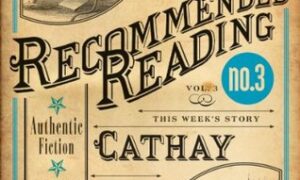 Demon Camp: A Soldier’s Exorcism by Jennifer Percy
Demon Camp: A Soldier’s Exorcism by Jennifer Percy
My rating: 3/5 cats



NEWS: http://www.hollywoodreporter.com/news…
loved it.
loved it so much he warned me that if i didn’t like it, we would no longer be friends.
no pressure, right? so i might be at risk of losing a friend here, but i have to say, while i liked this book, i do not feel the same love greg felt for it.
it’s a nonfiction account of jennifer percy (Benjamin Percy‘s sister) and the time she spent with a special ops soldier named caleb daniels, back from afghanistan, who was either suffering from severe ptsd or, as he claimed, the victim of a demon called “the black thing” or “the destroyer.” after his experiences in the war, which were horrifying, harrowing and gruesome, he sees and speaks to the dead members of his unit, and sees apparitions attached to other living, people. but even more eerily, even before his friends all died, he was having premonitions—vivid dreams about what would happen to them. what did happen to them. dreams that other soldiers were also having. spooky, spooky.
war happens, things blow up, people die. caleb is spared. but there is lasting damage to his psyche.
so percy goes to georgia to meet up and interview caleb. while there, at caleb’s insistence, she also goes to a christian demon exorcism camp where she undergoes a procedure, a “deliverance” to rid herself of the demons caleb sees on her, and encounters other people who believe themselves to be afflicted with demons.
it’s a fascinating topic, but a strange way of telling the story. it is not a journalistic account—the whole thing reads like borderline stream-of-consciousness, where time passes in a very unclear way—this whole thing took place over the course of three years, but there is no indication of that except in the flap copy—and there are just anecdotes out of context with strange details:
When Caleb finally told Allyson about his plans to assess, she threatened divorce, telling him that those were the guys who went to hotel rooms and cheated on their wives. Caleb assessed anyway. When he came home, Allyson wouldn’t talk to him. He found his uniform in the trash, buried in a snowfall of tissues. Dog hair and garbage all over the floor. There were no paper towels.
you see what i mean? percy is recounting the stories that caleb is telling her, but why that detail about the paper towels? why does caleb even mention that, and why does percy document it? the book is filled with things like this, and they stick out in the mind.
a generous me would say that it is meant to mirror the thought processes of someone who has been fragmented by their war experiences, but it doesn’t read like that, not really. it reads literary, not jumbled. everything is heightened with this storyteller’s glaze that makes it seem contrived. the first half is more of a tonal piece than anything substantial, and it reads like fiction because of both those jarring details and the mode of delivery.
It’s a Saturday, and by late afternoon all fifteen grandkids, ranging from two months to nine years, are in the yard, jumping on the trampoline, screaming, running naked. One pisses on the ground, facing me, as close as possible without hitting my feet. Another picks ants out of the portable swimming pool and eats them. A redheaded nine-year-old named Amaryllis comes up to me and opens her mouth. I feed her.
you see what i mean2? she’s a good writer, she has an interesting voice, a good eye for detail and an expressive style:
Portal, Georgia, which lies between Statesboro and Swainsboro, has 562 people, one streetlight, one restaurant called Pepper Jack’s, and a beauty pageant for infants called Baby Miss Turpentine. Dead armadillos are all over the road, shining dull the way I imagine diamonds look when pulled from the earth.
but these flourishes don’t, for me, seem to contribute to the ostensible story.
there isn’t a strong sense of when any of these stories are talking place, and you can only place the events in the narrative by what particular woman caleb is with at the time, where he is living, and with whom. there is a lot of back and forth, stories overlapping and repetition. the phrase where the layer between heaven and earth is very thin is used three times to describe a particular place, for example. and she mentions that she and caleb are eating cheese enchiladas twice when relating a conversation that takes place over those enchiladas; a conversation interrupted by several chapters.
as she gets more deeply involved in the lives of these people, she starts having her own nightmares and visions and it gets a little wacky towards the end. two words: bats. bats.
everything in this book reads surreal, but particularly towards the end, where it is very easy to forget that this is nonfiction.
the women in his life are fucked up
Caleb took her number and called her on Monday and on Tuesday they started dating.
The next time Caleb deployed, he gave Krissy a key to his apartment so she could look after it. When he came home, he found a new bedspread, new lace curtains for the windows. Framed photos of them hung on the wall. He found a diamond engagement ring in his shirt drawer. She’d used his credit card to buy it. “Don’t you want to be with me?” she said.
and
“While I was deployed,” he said, “the dog got pregnant and miscarried. The miscarried puppies were in a pile on the floor and Allyson had to call me in Iraq to ask what to do. I told her to put the dead dogs in the trash, but she wouldn’t do it. When I got home, the dead dogs were still in the house.”
the soldiers are fucked up
Once he was running thirty miles during a training exercise with a broken foot, limping, unsure if he could finish, The sergeant came up to him, handed him a thirty-pound weight from his rucksack, and asked Caleb to drop it on his foot. The sergeant’s foot. “Now I got a broke foot too,” the sergeant said. They continued on their run.
caleb is fucked up
Everywhere Caleb went he heard its voice. One time, he was in the kitchen, thinking about lunch. Ryan was sitting on the couch. “Tacos or burritos?” Caleb asked.
Fuck you, Ryan said, this is war.
“Ryan, what the fuck are you talking about?”
“Dude, I want tacos.”
It happened over and over again. In the end you aren’t going to win, said the voice coming out of Ryan.
the takeaway from this is: war will fuck you up.
oddly enough, it gets more interesting once she steps back from the quirky “characters”—when she interviews a neuropsychologist about ptsd, when the parallels between military service and the scarier bits of bible are made, when the horrifying statistics regarding soldier suicides after war are tallied up. the way families treat their sons’ widows, the way the government treats families, the way vets treat…everyone else. it’s all shocking and horrible.
i don’t know. there are a lot of interesting things in this book, but i’m left confused about what this book actually is. i would love to read something else by her, because i like a lot of what she does here, i am just left a little off-balance. which may be the point.
but i’m gonna miss greg. he was a good friend.
read my book reviews on goodreads







